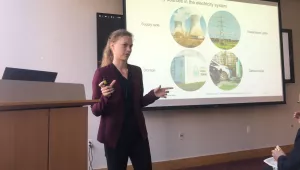Christine Gschwendtner is a Postdoctoral Research Fellow at the Environment and Natural Resources Program and the Science, Technology, and Public Policy Program. Her research focuses on sustainability in the built environment. She specifically aims at supporting the decarbonization of energy systems across sectors, particularly the transport and buildings sectors. She seeks interdisciplinary perspectives by combining civil engineering, data analytics, and social science.
In her work, she investigates how to support the adoption and integration of low-carbon technologies with focus on sector coupling and heterogeneous behavioral aspects, long-term planning at different technology diffusion stages, and both spatial and temporal considerations. Christine completed her PhD at ETH Zurich on the integration of electric vehicles into different electricity grid contexts with emphasis on mobility and charging behavior as well as demand management strategies. She holds a Master of Science in Environmental Change and Management from the University of Oxford and a Bachelor of Science in Environmental Engineering from the Technical University of Munich. She spent an academic year at the Engineering Department of the University of Cambridge and conducted a 6-month research stay at the Institute for Data, Systems, and Society at the Massachusetts Institute of Technology (MIT).
-
Postdoctoral Research Fellow, Environment and Natural Resources Program/Science, Technology, and Public Policy Program



